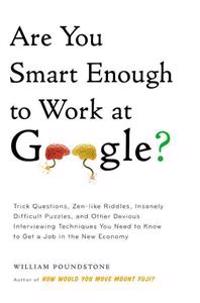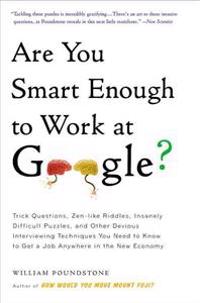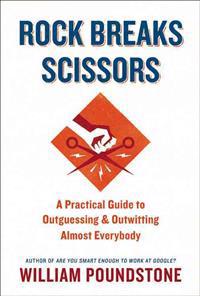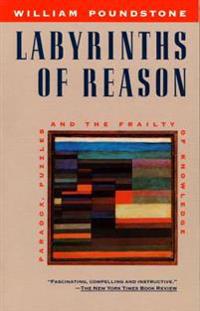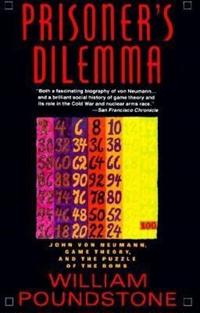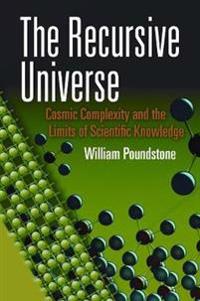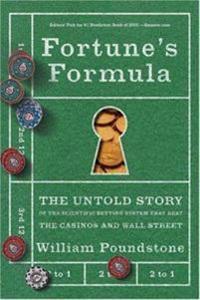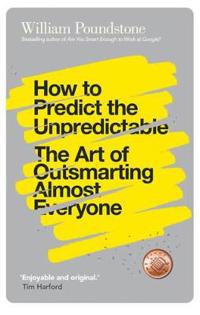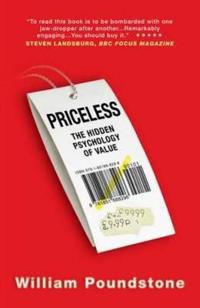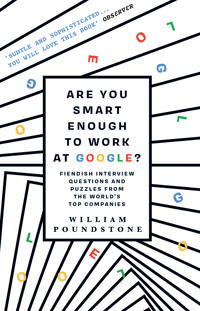Are You Smart Enough to Work at Google?: Trick Questions, Zen-Like Riddles, Insanely Difficult Puzzles, and Other Devious Interviewing Techniques You (Häftad)
avWilliam Poundstone
ISBN: 9780316099981 - UTGIVEN: 201209You are shrunk to the height of a nickel and thrown in a blender. The blades start moving in 60 seconds. What do you do? If you want to work at Google, or any of America's best companies, you need to have an answer to this and other puzzling questions.
ARE YOU SMART ENOUGH TO WORK AT GOOGLE? gui[...]Rock Breaks Scissors: A Practical Guide to Outguessing and Outwitting Almost Everybody (Inbunden)
avWilliam Poundstone
ISBN: 9780316228060 - UTGIVEN: 2014-06A practical guide to outguessing everything from multiple-choice tests to the office football pool to the stock market.
People are predictable even when they try not to be. William Poundstone demonstrates how to turn this fact to personal advantage in scores of everyday situations, from playing [...]Are You Smart Enough to Work For Google? (Pocket)
avWilliam Poundstone
ISBN: 9780316336291 - UTGIVEN: 2014-09How Would You Move Mount Fuji? (Pocket)
avWilliam Poundstone
ISBN: 9780316778497 - UTGIVEN: 200404Microsoft's interview process is a notoriously gruelling sequence of brain-busting questions that separate the most creative thinkers from the merely brilliant. So effective is their technique that other leading corporations - from the high-tech industry to consulting and financial services - are mo[...]
Labyrinths of Reason: Paradox, Puzzles, and the Frailty of Knowledge (Häftad)
avWilliam Poundstone
ISBN: 9780385242714 - UTGIVEN: 198912This sharply intelligent, consistently provocative book takes the reader on an astonishing, thought-provoking voyage into the realm of delightful uncertainty--a world of paradox in which logical argument leads to contradiction and common sense is seemingly rendered irrelevant.[...]
Prisoner's Dilemma/John Von Neumann, Game Theory and the Puzzle of the Bomb (Pocket)
avWilliam Poundstone
ISBN: 9780385415804 - UTGIVEN: 199302
"Both a fascinating biography of von Neumann, the Hungarian exile whose mathematical theories were building blocks for the A-bomb and the digital computer, and a brilliant social history of game theory and its role in the Cold War and nuclear a[...]The Recursive Universe (Häftad)
avWilliam Poundstone
ISBN: 9780486490984 - UTGIVEN: 201307This fascinating popular science journey explores key concepts in information theory in terms of Conway's "Game of Life" program. The author explains the application of natural law to a random system and demonstrates the necessity of limits. Other topics include the limits of knowledge, paradox of c[...]
Fortune's Formula: The Untold Story of the Scientific Betting System That Beat the Casinos and Wall Street (Häftad)
avWilliam Poundstone
ISBN: 9780809045990 - UTGIVEN: 200609In 1956 two Bell Labs scientists discovered the scientific formula for getting rich. One was mathematician Claude Shannon, neurotic father of our digital age, whose genius is ranked with Einstein's. The other was John L. Kelly Jr., a Texas-born, gun-toting physicist. Together they applied the scienc[...]
Priceless: The Myth of Fair Value (and How to Take Advantage of It) (Häftad)
avWilliam Poundstone
ISBN: 9780809078813 - UTGIVEN: 201101Prada stores carry a few obscenely expensive items in order to boost sales for everything else (which look like bargains in comparison). People used to download music for free, then Steve Jobs convinced them to pay. How? By charging 99 cents. That price has a hypnotic effect: the profit margin of th[...]
How to Predict the Unpredictable (Häftad)
avWilliam Poundstone
ISBN: 9781780744070 - UTGIVEN: 2014-09We are hard-wired to believe that the world is more predictable than it is. We chase 'winning streaks' that are often just illusions, and we are all too predictable exactly when we try hardest not to be. In the 1970s, Daniel Kahneman and Amos Tversky coined the phrase 'representativeness' to describ[...]
Priceless (Pocket)
avWilliam Poundstone
ISBN: 9781851687824 - UTGIVEN: 2010-09-01Revealing how everday pricing manipulates us.
Priceless (Häftad)
avWilliam Poundstone
ISBN: 9781851688296 - UTGIVEN: 201106Why do text messages cost money while e-mails are free? Why do cereal packets keep getting smaller? Why do so many prices end in 9? In "Priceless", bestselling author William Poundstone reveals how we perceive value and how businesses set the prices we pay. Rooted in the emerging field of behavioura[...]
Are You Smart Enough To Work At Google? (Pocket)
avWilliam Poundstone
ISBN: 9781851689170 - UTGIVEN: 2012-04-01Pit your brains against the taxing riddles used by the world's best companies to select their staff
Are You Smart Enough to Work at Google? (Häftad)
avWilliam Poundstone
ISBN: 9781851689552 - UTGIVEN: 201303You are shrunk to the height of a penny and thrown in a blender. The blades start moving in sixty seconds. What do you do? If you want to work at Google, or any of the world's top employers, you'll need to have a convincing answer to this and countless other tricky puzzles. Are You Smart Enough to [...]

